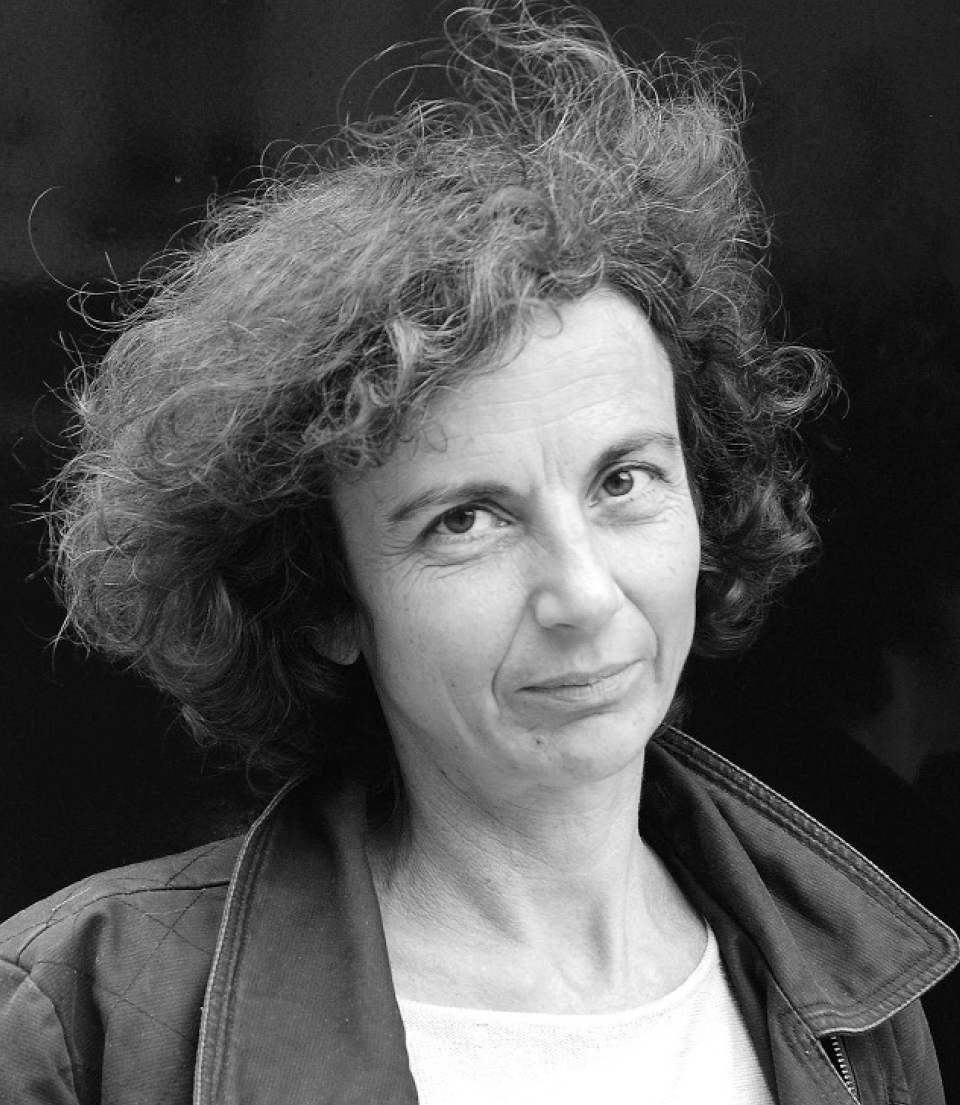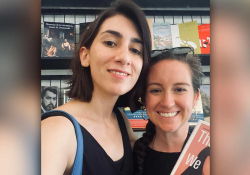Writing the “Almost Nothing” of Life: A Conversation with Noémi Lefebvre

Noémi Lefebvre is a multitalented writer. She studied music, received a PhD in music education and national identity in France and Germany, and has worked as a researcher in political science. Writing is not her full-time job and, as she says in her own words, “I’m not a writer; I write.” Lefebvre makes the case for the joy of writing, as one might take pleasure in a hobby that one is passionate about. Having already written five critically acclaimed novels, Lefebvre’s hobby reveals not only her protean talent but her originality. The power of her writing comes from a willingness to wrestle with major questions with an intelligent, curious, and open mind. Even as she tackles serious subjects, her dexterity and humor create a joyous sensation as we follow the twists and turns of her ideas. It is rare that a writer can combine the playful and profound with such skill.
When we spoke in May 2021, Poètique de l’emploi had just been published in English, and Parle (2021) had been released in France. In Poètique de l’emploi, an anonymous narrator wanders the streets of Lyon after a state of emergency has been declared in France, and few jobs are available at the unemployment office. Agonizing over where, how, and why to get a job, the narrator tries to answer whether a job could ever be available to a poet. Blending philosophy, novel, essay, and poetry, Lefebvre astutely examines globalization, the rise of nationalism, and how social policies truly affect us on an individual level. With these latest works, Lefebvre continues to push the boundaries of form, to interact with art and literature of the past and present, and to inexorably search for the truth of the world we live in.
 Sarah Moore: Your most recent work to be translated into English, Poètique de l’emploi, considers the question of employment. The English translation of emploi, which variously means “employment,” “use,” and “labor,” into “work” already shows the tension that you explore between how we earn a living and how we spend our time. How do you feel these different aspects relate to each other? Why were you interested in the subject?
Sarah Moore: Your most recent work to be translated into English, Poètique de l’emploi, considers the question of employment. The English translation of emploi, which variously means “employment,” “use,” and “labor,” into “work” already shows the tension that you explore between how we earn a living and how we spend our time. How do you feel these different aspects relate to each other? Why were you interested in the subject?
Noémi Lefebvre: First, it’s a subject that affects me. I don’t understand the link between work and salary or why, when I work, I’m not earning much of a living. For example, when I write, I don’t earn much money, but that’s my real job. There isn’t a clear connection between the money we earn and the work we do. Also, work is a social condition that we’re all supposed to accept but one that often significantly restricts freedom. That’s what I wanted to consider. When a baby is born we don’t think, “Oh, super, it’s going to have a wonderful job,” unless, of course, you’re very narrow-minded. We think first about life and freedom, not in terms of paid work. I wanted to explore what remained childlike in me and what retains the desire to always be free in life, while work is often restrictive or creates living conditions that are just impossible—not for everyone but, still, often.
When I write, I don’t earn much money, but that’s my real job.
Moore: There is also a tension within the narrator for whom the search for employment is agonizing but to whom the idea of having a job is equally agonizing.
Lefebvre: Yes, it’s a tension I saw in my children, for example, or even in myself. I tried to write what isn’t often spoken about: that we can easily worry about doing something and about not doing it. The worry doesn’t come from the same place. There is a social anxiety and a personal anxiety that mix together. I wanted to reveal that in fiction because, when work is done in the social sciences on the question of employment, it doesn’t try to look at personal experiences—only fiction can bring that. The social sciences look at other aspects of employment that fiction can’t explain. But in Poètique de l’emploi, I am trying to make the mechanism clear: how we can also be against our own sense of being.
Moore: The backdrop to Poètique de l’emploi is Lyon, with civil unrest, extensive military presence, and shouts of “fascist!” being yelled on the streets. Did the political context of France at the time influence your writing?
Lefebvre: Yes, I had started writing on the question of work before 2016, but the text was turning in circles. Then, by the start of 2016, with the terrorist attacks, the Bataclan shooting, and so many violent, shocking things having happened, I realized how it had become difficult to write about the everyday. I needed to take stock of how hard it is to talk about the everyday when there’s no longer an everyday, only urgency. That’s how I transformed the text and why it found its place in 2016.
It’s also a question of time because there are three different times at play, which can almost flow together in the same sentence. That’s what’s interesting, looking for the stress of this character who is in several different times at once: the time for poetry that is a time to flâner, to walk and seek impressions; the time for job-hunting that is a much more compressed time; and then the political time of the situation in France in 2016 that was so very strange.
Moore: Your books often take the form of dialogues. Poètique de l’emploi is an exchange between the narrator and the father character. You even mention Plato’s dialogues, and the “Lesson” parts also reminded me of Rilke’s Letters to a Young Poet. L’Autoportrait bleu is a monologue, while in your latest work, Parle, a group that has come to take inventory before selling a house questions a silent member of the group. What’s the attraction of these dialectic forms? What’s the importance of voice?
Lefebvre: I always have several voices in my head, a bit like a Bach fugue or Plato’s dialogues. We always have our thoughts, which are nourished on contradictions, and we are always in the process of freeing several happenings in our heads. I like sharing these interior discussions by making scenes out of them. It’s true that, in L’Autoportrait bleu, the pianist is a very reflective, interior figure. He really exists, but he is mainly in his head, like a sort of partner, in order to think more about the question of resistance, the question of his relationship with music, and about the history of Europe. That allows him to manifest an advancement in his internal thoughts that otherwise would just disappear in daydreams.

I always have several voices in my head, a bit like a Bach fugue or Plato’s dialogues.
And the father figure is also fun in Poètique de l’emploi because he is a stereotype in Western culture in the psychoanalytic model. Or, he’s the superego, the authority in the spirit of everyone, who will control and educate. I wanted to create a character like that but who at the same time is very lifelike because he doesn’t get everything right; he’s contradictory. It’s fun to create characters with an oneiric personality, a bit like Don Quixote, or the characters in Rabelais. Characters who are epic and do lots of fantastical things.
Moore: You often seem to consider the difficulty of freeing those internal voices in your fiction. L’Autoportrait bleu begins with the narrator struggling to speak, agonizing over situations in which she couldn’t easily talk, and worrying that she spoke too much. And you’ve just written Parle, where the right to speak is fought over, but the silent character is seen as suspicious. Why do you think this is such a prominent theme in your works?
Lefebvre: I’d need to see a psychoanalyst to answer that! Because it interests me. I think that people who write are people who aren’t able to truly express themselves when they want to in everyday conversation. They need a space for themselves to construct their thoughts and their expressions, then to give it to be read. We’re not very adept at expressing ourselves in everyday life, really. Or we suffer from not being heard. I think lots of writers suffer from not being heard.
Moore: One of the questions that the narrator asks in Poètique de l’emploi is whether there is enough poetry in the world. This launches the debate on the use of poetry as well as the use of work: “What earthly good is poetry?” They’re complicated questions, but how would you answer them?
Lefebvre: I think poetry is the most fragile thing and the most necessary. It’s extremely fragile. Poetry is always about fragility, but if there isn’t poetry, there’s nothing left except political or economic slogans. So, poetry itself is the only way of truly expressing what poetry is.
Moore: The narrator of L’Autoportrait bleu is a woman who discusses her gender and complains about the expectations of traditional feminine demeanor. But your more recent works have opted for more anonymous characters. For example, the narrator of Poètique de l’emploi has no gender markers and is, moreover, completely anonymous. We never know their gender, age, name, or other details. Why have you moved toward this anonymity?
Lefebvre: First, it’s a game. I realized when writing that in order to invent a character you need very little. There’s no need to describe their appearance or to know in which year they were born. You don’t even need to know their name or whether they’re male or female. To give the illusion that there’s a human being, all you need is to make someone think something and bring them to life. Life is almost nothing. And it’s interesting to look for this almost nothing at all that we believe about the character anyway. I wanted the reader to choose what they wanted. Forty years old? Twenty? We can’t know, and I like that.
The second aspect is that I find it very difficult to write with a female narrative voice because it causes certain kinds of reading and will discourage certain things. I want to escape from stereotypes when writing. I needed them to not have a gender so that the character could have a much more open psyche.
Moore: All of your books feature these very vivid narrators despite this, as you say. What’s your relationship to them? Do you find yourself putting parts of yourself into their characters, or is there always a distance?
Lefebvre: In L’Autoportrait bleu, there’s no distance at all because it’s a completely true account; the girl is me. There is a game and a mise-en-scène, but that’s it. Otherwise, the narrators are always invented. However, I often draw on people around me and sometimes my own children, who can help me understand certain things.
Moore: Your characters are frequently responding to other works of art. Most obviously to Schoenberg’s painting in L’Autoportrait bleu, but also to music, books, and other forms of art. Would you say that your writing is a response to other art forms? Is it inspired by works of art?
Lefebvre: Sometimes it’s a response, yes. But sometimes I take advantage of writing to understand something better. For L’Autoportrait bleu, I wanted to better understand the connection between Schoenberg’s painting and Nazism, for example. I tried to get to the bottom of the question because I think it’s as vital as the question of knowing what it means to work.
Moore: In addition to the link between Schoenberg’s painting and Nazism, your books are full of references to history, especially the history of Europe in the Second World War. Why do you incorporate this into your works, which are simultaneously rooted in contemporary political situations? Would you say that you use the past in order to better interrogate the current political climates that you explore?
Lefebvre: Yes, I think that the ideas we have in 2021 aren’t completely new. It’s often the old ideas that illuminate the new ones, sometimes better than a good newspaper editorial or a contemporary philosopher. Montaigne’s ideas are as important to know today as previously. There are ideas which are timeless and that shine a light on reality. It’s the same for painting and music.
Moore: In Tais-toi, the postscript to Parle, which takes the form of a dialogue with Flaubert, you talk about the separation between writing and ordinary language; of a tension toward style. How does your own writing relate to this ordinary language?
Lefebvre: For me, ordinary language is writing material. It’s a huge array of forms, and it’s fun to catch it in order to write. You can never use ordinary language in a naïve way. You always have to transform it, so there’s a distance.
Moore: You mention having fun, and even when their subject matter isn’t lighthearted, your books are often very funny. Do you experience a lightness and joy when you’re writing?
Lefebvre: What’s really funny is that when I start writing, the texts are actually quite tragic and serious! So I say to myself, “How strange, I’m writing a serious text” and transform it to have more and more fun with it. The text becomes lighter because I like mixing the seriousness of the subject without destroying it, showing that we can be lighthearted with these subjects at the same time.
Moore: Tais-toi is a really playful work; at one point you reference and reuse a phrase spoken by the father character in Poètique de l’emploi that amuses you. You also talk about considering a writer’s entire oeuvre. With the father character passing from one book to another, is the idea of an oeuvre something you ever think about in relation to your own work?
Lefebvre: When I start writing, I always want to do something different than the previous book. I’m looking for another form. So in that sense, it’s not an oeuvre. It’s not In Search of Lost Time, or even Bernhard’s works that I admire and that always have the same form. Constantly doing the same thing doesn’t interest me. But the idea of an oeuvre is interesting because there are many things we can only understand as an oeuvre due to its aspect of finality, of perfection. I’m also looking for that perfection, but if I write one work that holds together and works on its own, there’s no need for more.
Moore: You mention so many other writers in your books, such as Bernhard, but also Kafka, Karl Kraus, Rilke, Schiller, Zola, Rimbaud, Allen Ginsberg, and many others. Are these the writers you like the most?
Lefebvre: Generally, I like the writers that I reference in my books. But I do read writers that I don’t like because I want to see something that they’re doing. For example, at the moment I’m rereading American literature, specifically Philip Roth. He writes in a manner completely different from me, and I find his way of approaching politics fascinating. He approaches it in a very general manner, from an intellectual position rather than from experience. My characters are always giving the impression that they experience politics before understanding it. But for him, it’s the reverse. His characters first understand and then feel it, which is interesting.
Moore: The topic of globalization is very present in Poètique de l’emploi, and the narrator often seems conflicted between their own personal situation and everything that is happening politically in the world. These events seem so urgent but at the same time are so distant.
Lefebvre: One of the effects of the terrorist attacks in France was to impose geopolitical situations on individuals that are normally dealt with between states, and over which we don’t have much possibility of taking action. This has already been explained much better than me by Musil or Proust in their books, for example. Political events fall on top of us, and the internationalization of problems falls upon any small individual in any village. That’s what’s difficult.
Moore: You also have a blog on the independent French journalism website Mediapart. Could you tell us a bit more about this blog?
Lefebvre: It really helped my writing. It’s training. You learn everything by writing short texts; that’s the basis for learning to write, and it’s there that I learned to write. The blogs on Mediapart are usually political, while my blog is very literary, so it also amused me to have it there.
You can’t be afraid of yourself when writing, but at the same time you need to be afraid because writing reveals who you really are.
Moore: In Tais-toi, you speak about the vulnerability of writing. How do you manage that vulnerability?
Lefebvre: You can’t be afraid of yourself when writing, but at the same time you need to be afraid because writing reveals who you really are. It’s difficult because you don’t always want to know. You need to go looking for it, and then afterward, it transforms itself. That’s when it’s wonderful, when it transforms. Above all, writing saved me a lot of money on psychoanalysis.
May 2021
Translation from the French
 Born in Caen in 1964, Noémi Lefebvre received wide acclaim for her first novel, L’Autoportrait bleu (2009), which was translated by Sophie Lewis as Blue Self-Portrait (2017) and was shortlisted for the Scott Moncrieff Prize. This was followed by L’État des sentiments à l’âge adulte (2012), L’enfance politique (2015), and Poètique de l’emploi (2018; Eng. Poetics of Work). Lefebvre contributes regularly to the independent French journalism site Mediapart and to the bilingual French-German literary review La mer gelée.
Born in Caen in 1964, Noémi Lefebvre received wide acclaim for her first novel, L’Autoportrait bleu (2009), which was translated by Sophie Lewis as Blue Self-Portrait (2017) and was shortlisted for the Scott Moncrieff Prize. This was followed by L’État des sentiments à l’âge adulte (2012), L’enfance politique (2015), and Poètique de l’emploi (2018; Eng. Poetics of Work). Lefebvre contributes regularly to the independent French journalism site Mediapart and to the bilingual French-German literary review La mer gelée.










